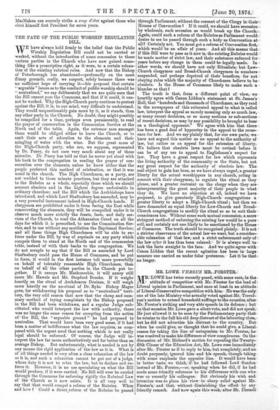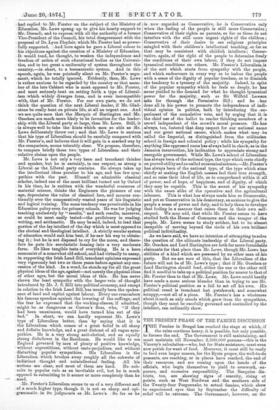MR. LOWE VERSUS MR. FORSTER.
ifR. LOWE has twice recently posed, with some care, in the . ..V1 attitude of competitor with Mr. Forster for the lead of Liberal opinion in Parliament, and once at least in an attitude of Liberal-Conservative competition with him. He was the only one of the late Ministry who actually voted against Mr. Trevel- yan's motion to extend household suffrage to the counties, after Mr. Forster's striking and very able speech in its defence ; but on that occasion Mr. Lowe gave a silent vote, and did not speak. He just allowed it to be seen by the Parliamentary party that he retains to the full his old deep distrust of the labouring class, but he did not advertise- his distrust to the country. But when he could give, or thought that he could give, a Liberal reason for taking the line of antagonism to Mr. Forster, he was resolved to make his difference of view conspicuous. On the discussion of Mr. Richard's motion for repealing the Twenty- fifth Clause of the Education Act, Mr. Lowe rose immediately after Mr. Forster as if to reply to him, but completely, and no doubt purposely, ignored him and his speech, though taking with some emphasis the opposite line. It would have been in better taste, we think, if he had followed Lord Bandon instead of Mr. Forster,—or, speaking when he did, if he had made some friendly reference to his differences with one who was so recently his colleague. Bat obviously his wish and intention was to place his view in sharp relief against Mr. Forster% and that, without diminishing the effect by any friendly remark. And now again this week, after Mr. Disraeli had replied to Mr. Forster on the subject of the Ministry of Education, Mr. Lowe sprang up to give his hearty support to Mr. Disraeli, and to express, with all the authority of a former Vice-President of the Council, his total disagreement with the proposal of Dr. Lyon Play fair, which Mr. Forster had so power- fully supported. And here again he gave a Liberal colour to his objections against the creation of a Ministry of Education. It would tend, he thought, to weaken the independence and freedom of action of such educational bodies as the Universi- ties, and to too great a uniformity of system throughout the country,—in short, to a bureaucratic system. And in this speech, again, he was pointedly silent on Mr. Forster's argu- ment, which he totally ignored. Evidently, then, Mr. Lowe is rather anxious to be regarded by the country as that mem- ber of the late Cabinet who is most opposed to Mr. Forster, and most seriously bent on setting forth a type of Liberal- ism which widely diverges from, and is even incompatible with, that of Mr. Forster. For our own parts, we do not think the question of the next Liberal leader, if Mr. Glad- stone be really bent on private life, at all an urgent one. And we are quite sure that the Marquis of Hartington and Mr. Goschen are much more likely to be favourites for the leader- ship with the Liberal party at large, than Mr. Lowe. Still, it is always well to take the hints which men so able as Mr. Lowe deliberately throw out ; and that Mr. Lowe is anxious that his type of Liberalism should be carefully compared with Mr. Forster's, and believes that it will gain in a marked way by the comparison, seems tolerably clear. We propose, therefore, to compare briefly these two types of Liberalism and their relative claims upon the people.
Mr. Lowe is not only a very keen and trenchant thinker and speaker, but he is certainly, in one respect, as strong a Liberal as the Liberal party contains. He always takes up the intellectual ideas peculiar to his age, and has few sym- pathies with the past. Himself an admirable classical scholar, indeed one of the most brilliant turned out by Oxford in his time, he is smitten with the wonderful resources of material science, thinks the Engineers the pioneers of our age, depreciates the value of classical lore, and mourns con- tinually over the comparatively wasted years of his linguistic and logical training. The same tendency was perceivable in his Education policy even for primary schools. He was for judging teaching exclusively by "results," and such results, moreover, as could be most easily tested—the proficiency in reading, writing, and arithmetic. He may be said, indeed, to lead that portion of the lay intellect of the day which is most opposed to the clerical and theological intellect. A strictly secular system of education would suit him best, if he saw his way to obtain- ing it ; but he is not disposed to cry for the moon, and there- fore he puts his secularistic leaning into a very moderate form. He likes tangible tests of everything. He is a keen economist of a somewhat old school, and had virtually to unsay, in supporting the Irish Land Bill, trenchant opinions expressed very vigorously but two or three years before against any con- cession of the kind. In a,word, he stands up for all the great physical ideas of the age, against—not merely the physical ideas of other ages, but the moral ideas of this. He has never shown the least sympathy with the larger vein of thought introduced by Mr. J. S. Mill into political economy, and except in relation to the Irish Land Bill, has usually been the spokes- man of land and capital against labour. Every one remembers his famous speeches against the lowering of the suffrage, and the fear he expressed that the working-classes, if admitted, might be as dangerous as Curran's fleas, who, "if they had been unanimous, would have turned him out of the bed." In short, we can hardly represent Mr. Lowe's type of Liberalism better, than by saying that it is the Liberalism which comes of a great belief in all sharp and definite knowledge, and a great distrust of all vague sym- pathies. He is a very strong anti-clerical, and an equally strong disbeliever in the Residuum. He would like to see England governed by men of plenty of positive knowledge, without superstitions, without caste-prejudices, and without disturbing popular sympathies. His Liberalism is the Liberalieui which brushes away roughly all the cobwebs of indistinct thought and nnintellectual feeling. All his notions are clear, and most of them are hard. He sub- mits to popular rule as an inevitable evil, but he is much opposed to submitting to it sooner or more completely than he need.
Mr. Forster's Liberalism seems to us of a very different and of a much higher type, though it is not so sharp and epi- grammatic in its judgments as Mr. Lowe's. So far as he
is now regarded as Conservative, he is Conservative only when the feeling of the people is still more Conservative ; Conservative of their rights as parents, so far as these do not interfere with the still more urgent rights of the children ; Conservative of their desire to see religious principles mingled with their children's intellectual teaching, so far as that may be consistent with childish intellects ; Conser- vative, again, of the right of the people to determine freely the conditions of their own labour, if they do not impose tyrannical conditions on others. Mr. Forater's Liberalism is of the sort which starts from sympathy with the people, and which endeavours in every way so to imbue the people with a sense of the dignity of popular freedom, as to diminish the tendency to a tyranny of the majority. Indeed, in spite of the popular sympathy which he feels so deeply, he has never yielded to the demand for what he thought tyrannical power for the majority, such as Sir Wilfrid Lawson asks for through the Permissive Bill ; and he has done all in his power to promote the independence of indi- vidual opinion in politics, both by introducing the ex- periment of the cumulative vote, and by urging that it is the chief use of the ballot to render thinking, members of a crowd independent of the crowd's moral pressure. He has always, too, fostered that deep respect for our national name and our great national career, which makes what may be called the Imperial, as distinguished from the utilitarian school in foreign and colonial policy ; while his sympathy for anything like oppressed races has always held in check, as in the Jamaica insurrection, his inclination to appreciate strong and energetic government. While Mr. Lowe's school of Liberalism has always been of the notional type, the type which rests chiefly on proved utility and so-called economical science,—Mr. Forster's has always been of the national type, of the type which aims chiefly at making the English masses feel their true strength, and so raise their ideal of life, as to comprehend within it all of power, and of hope, of happiness, and of dignity, of which they may be capable. This is the secret of his sympathy with the cause alike of the operative and the agricultural labourer. This is what has always made him so Democratic, and yet so Conservative in his democracy, so anxious to give the people a sense of power and duty, and to help them to develope that feeling in a manner that raises them in their own self- respect. We may add, that while Mr. Forster seems to home studied both the House of Commons and the temper of the people, Mr. Lowe seems to study neither, but to be almost incapable of moving beyond the circle of his own brilliant political individuality.
As walleye said, we have no intention of attempting to solve the question of the ultimate leadership of the Liberal party. Mr. Goschen and Lord Hartington are both far more formidable claimants for that place than Mr. Lowe, though"Mr. Lowe has abilities of a kind which are possessed by no other man of his party. But we are sure of this, that the Liberalism of the future will not be of Mr. Lowe's type ; that if Mr. Goschen or Lord Hartington should lead, either the one or the other will find it needful to take up a political position far nearer to that of Mr. Forster than to that of Mr. Lowe. Mr. Lowe could hardly have made a more serious blunder than in trying to use Mr. Forster's political position as a foil to set off his own. His political creed is trenchant but patchwork, and somewhat scrappy,—not all of a piece. Mr. Forster's has a wholeness about it such as only creeds which grow from the sympathies, though they must be carefully governed and controlled by the intellect, can ordinarily show.



































 Previous page
Previous page